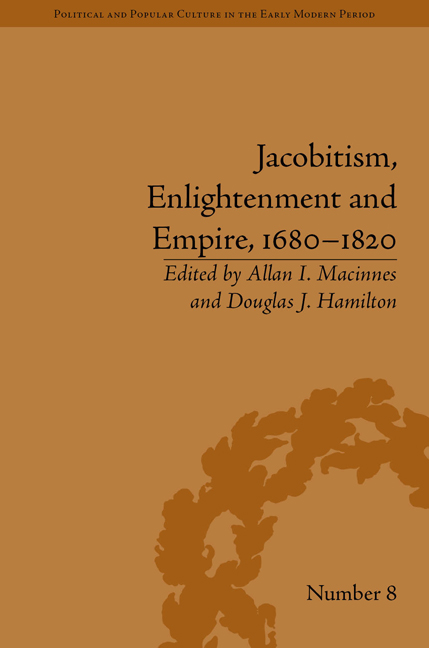Book contents
- Frontmatter
- CONTENTS
- List of Contributors
- List of Tables
- Introduction: Identity, Mobility and Competing Patriotisms
- 1 Jamie the Soldier and the Jacobite Military Threat, 1706–27
- 2 Simply a Jacobite Heroine? The Life Experience of Margaret, Lady Nairne (1673–1747)
- 3 Missionaries or Soldiers for the Jacobite Cause? The Conflict of Loyalties for Scottish Catholic Clergy
- 4 English Liturgy and Scottish Identity: The Case of James Greenshields
- 5 ‘Let Him be an Englishman’: Irish and Scottish Clergy in the Caribbean Church of England, 1610–1720
- 6 Scotland, the Dutch Republic and the Union: Commerce and Cosmopolitanism
- 7 Clearing the Smokescreen of Early Scottish Mercantile Identity: From Leeward Sugar Plantations to Scottish Country Estates c. 1680–1730
- 8 Union, Empire and Global Adventuring with a Jacobite Twist
- 9 John Drummond of Quarrel: East India Patronage and Jacobite Assimilation, 1720–80
- 10 William Playfair (1759–1823), Scottish Enlightenment from Below?
- 11 The Visionary Voyages of Robert Burns
- 12 ‘Defending the Colonies against Malicious Attacks of Philanthropy’: Scottish Campaigns against the Abolitions of the Slave Trade and Slavery
- Abbreviations
- Notes
- Index
9 - John Drummond of Quarrel: East India Patronage and Jacobite Assimilation, 1720–80
- Frontmatter
- CONTENTS
- List of Contributors
- List of Tables
- Introduction: Identity, Mobility and Competing Patriotisms
- 1 Jamie the Soldier and the Jacobite Military Threat, 1706–27
- 2 Simply a Jacobite Heroine? The Life Experience of Margaret, Lady Nairne (1673–1747)
- 3 Missionaries or Soldiers for the Jacobite Cause? The Conflict of Loyalties for Scottish Catholic Clergy
- 4 English Liturgy and Scottish Identity: The Case of James Greenshields
- 5 ‘Let Him be an Englishman’: Irish and Scottish Clergy in the Caribbean Church of England, 1610–1720
- 6 Scotland, the Dutch Republic and the Union: Commerce and Cosmopolitanism
- 7 Clearing the Smokescreen of Early Scottish Mercantile Identity: From Leeward Sugar Plantations to Scottish Country Estates c. 1680–1730
- 8 Union, Empire and Global Adventuring with a Jacobite Twist
- 9 John Drummond of Quarrel: East India Patronage and Jacobite Assimilation, 1720–80
- 10 William Playfair (1759–1823), Scottish Enlightenment from Below?
- 11 The Visionary Voyages of Robert Burns
- 12 ‘Defending the Colonies against Malicious Attacks of Philanthropy’: Scottish Campaigns against the Abolitions of the Slave Trade and Slavery
- Abbreviations
- Notes
- Index
Summary
The participation of Jacobites in the affairs of the Honourable East India Company (EIC) began midway through the 1720s, that is, thirty years after the enforced exile of James VII & II. By the 1730s a number of privileged Scots tainted with Jacobitism had become proprietors, while others, or their sons, became EIC employees, crew on board East Indiamen or free merchants trading in the east. Why this was so, how it came about and how it was used to reintegrate Jacobites into mainstream Scottish life are analysed in what follows. The study embraces the crucial initial role of the Scot John Drummond of Quarrel in these developments. It offers an assessment of how far EIC patronage was helpful for erstwhile followers of the house of Stuart, and allowed leading Scottish Jacobite members to escape from the predicament in which they found themselves.
I
After the Glorious Revolution, continuing support for the exiled James VII & II and his descendants was justly recognized as a very great threat to the governments of William of Orange, Queen Anne and then the Hanoverians. Jacobitism was a formidable phenomenon that deserved the deliberate and sometimes frantic efforts of adversaries to confine and eventually overcome it. Menace attended the risings in Scotland; there was fervent Jacobite support in Ireland, with numerous English sympathizers, especially in the north. There was the ever-present possibility of French collaboration.
- Type
- Chapter
- Information
- Jacobitism, Enlightenment and Empire, 1680–1820 , pp. 141 - 158Publisher: Pickering & ChattoFirst published in: 2014



